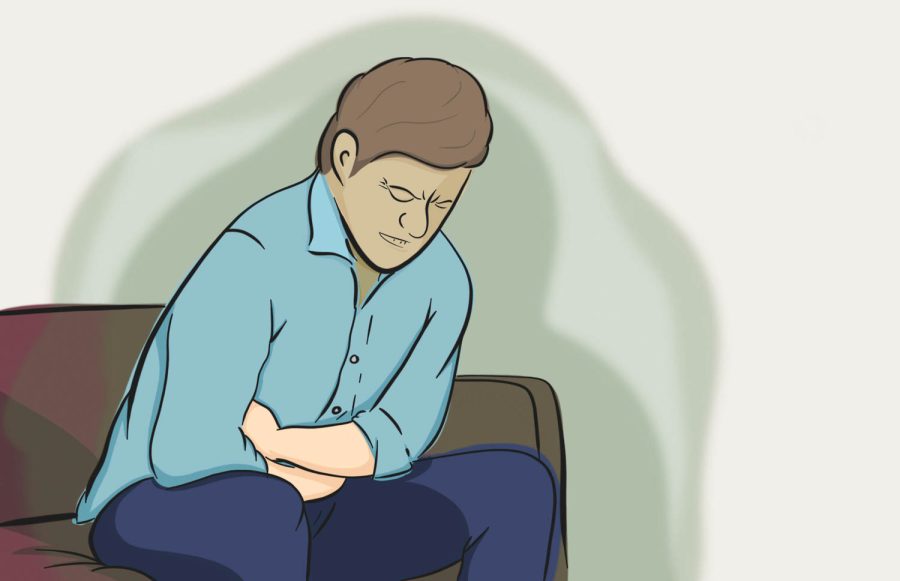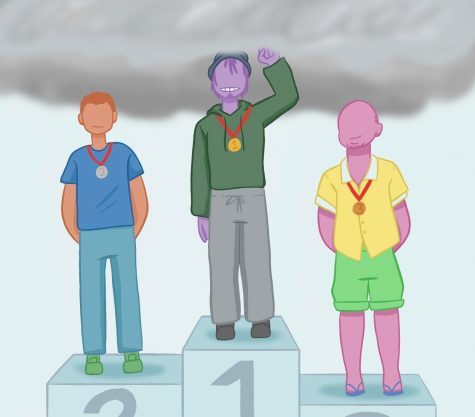Cannabinoid Hyperemesis Syndrome: Dangers of the stoner lifestyle
Increasing potency likely to cause more cases of CHS, more medical knowledge of condition
Some people deny their CHS diagnosis because cannabis is often thought of as a treatment for nausea, not something that causes it.
April 14, 2022
Cannabinoid Hyperemesis Syndrome is a medical condition causing repeated and severe vomiting in long-time daily cannabis users.
CHS has a very brief history in the world of medicine, first described in 2004 by a team of researchers in Australia. Now, 18 years later, CHS still is a relatively unknown condition to many cannabis users.
With cannabis being legalized in many states, CHS is likely to become more well-known in the medical and cannabis communities in the near future.
The increasing potency of cannabis is likely to cause more cases of CHS moving forward. People who use concentrated cannabis can experience symptoms of CHS quicker than those using flower forms because of the concentrate’s high potency. On average, concentrates have three times as much tetrahydrocannabinol, the chemical responsible for the mental effects of cannabis, as buds, according to a Karger review article.
CHS is often misdiagnosed because it is not widely known in the medical community, according to an article in Current Drug Abuse Reviews. Misdiagnosis is also common because daily cannabis users often do not disclose their usage to doctors because cannabis still has negative stigmas attached to it.
Some people deny their CHS diagnosis because cannabis is often thought of as a treatment for nausea, not something that causes it. For example, cannabis is widely used as an anti-nausea remedy for chemotherapy patients.
These patients find relief from their nausea after using cannabis, making their chemotherapy regimen easier to handle. However, there have been multiple cases of chemotherapy patients developing CHS after repeated daily use, according to the Karger review article.
Most cases of CHS can be self-diagnosed, which involves taking a hot shower. If the pain and nausea are relieved while taking a hot shower, the person likely suffers from CHS, according to the Current Drug Abuse Reviews article. Not much is known as to why hot showers help relieve symptoms of CHS, and more research on the topic is likely to be published in the future.
Topical creams, such as those containing capsaicin, have also been known to provide relief for those with CHS.
In some cases, people have to be hospitalized for their CHS, according to the Current Drug Abuse Reviews article. Those who are hospitalized receive intravenous fluid and can be prescribed medications to help with nausea. The at-home treatment equivalent is drinking something like Pedialyte to help with dehydration.
CHS symptoms disappear after one to two days of abstaining from cannabis use. Some people experience prolonged CHS episodes because they deny that using cannabis is what causes their nausea and vomiting, according to the Karger review article.
If CHS goes untreated, complications can occur. Some possible complications include muscle spasms, seizures, kidney failure, heart rhythm abnormalities and shock, according to Cedars Sinai Medical Center.
The only solution for stopping CHS symptoms from occurring is to completely stop using cannabis in all forms.
Why does CHS cause vomiting?
After using cannabis, cannabinoid molecules traverse through the bloodstream and into the brain, giving users the feeling of being “high.”
However, cannabinoids do not only go to the brain. Cannabinoids in the digestive tract inhibit digestion, and a build-up of cannabinoids in the stomach can alter the time it takes for the stomach to empty, according to the Current Drug Abuse Reviews article.
The esophageal sphincter — the muscle that separates the esophagus from the stomach — is loosened by cannabinoids. When the esophageal sphincter is loosened, food has an easier time coming back up, which leads to severe bouts of vomiting, according to the Karger review article.

















